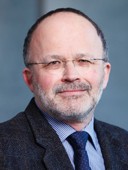Prof. em. Markus Rudin

Prof. em. Markus Rudin
Professor Emeritus at the Department of Information Technology and Electrical Engineering
ETH Zürich
Additional information
Markus Rudin is full professor for Molecular Imaging and Functional Pharmacology at the Institute for Biomedical Engineering (D-ITET) since June 2006. Since March 2005 he is also full professor for Molecular Imaging and Functional Pharmacology at the University of Zürich both at the Institute for Biomedical Engineering and the Institute for Pharmacology and Toxicology.
Markus Rudin (born 1953, from Lauwil BL) received his diploma in chemistry at the ETHZ in 1976 and his PhD at the Laboratory for Physical Chemistry in 1981 in the field of electron spin resonance / electron-nuclear double resonance, followed by a post-doctorate in the same area. In 1983 he moved to biomedical imaging, joining Sandoz AG to build up a biomedical imaging group initially focused on magnetic resonance imaging. He received his basic training in imaging at the Biocenter of the University of Basel. Within Sandoz AG, later Novartis Pharma AG, he became head of the Biophysics Group, head of the In-vivo Models Unit and finally head of the Analytical and Imaging Science Unit within Discovery Technologies at the Novartis Institutes for Biomedical Research. In this function he was also deputy head of Discovery Technologies until 2005. In 1997 he became Privat Dozent for Biophysics at the University of Basel. Since March 2005, he is member of the Research Council of the Swiss National Science Foundation.
Markus Rudin is heading a research group at the animal imaging center of UZH and ETH located at ETH Hönggerberg focusing on MRI and optical imaging methods (fluorescence tomography). His research focus is the development of non-invasive imaging techniques for studying structure, physiology, and metabolism of tissue as well as cellular and molecular events in the intact organism, in particular assays for monitoring signal transduction pathways. Biomedical applications are in neuroscience and metabolic diseases.